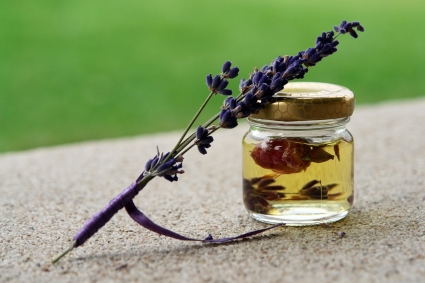The examples below, which make up a basic aromatherapy kit, are provided for information purposes only. Nothing can replace the consultation of a health professional.
Essential oils not to be missed
-
Tropical basil : For bloating, dilute one drop of essential oil (EO) in four drops of vegetable oil, to be taken two or three times a day. Tropical basil is also recognized for its soothing properties, and can be used for minor sleep disorders : one or two drops in a little honey before bedtime.
-
Lemon eucalyptus : Its many indications include relief of a variety of aches and pains (osteoarthritis, sprains, lumbago, sciatica, arthritis). Less well known, its application to a mosquito-bitten area can reduce itching. One drop of EO in four drops of vegetable oil, followed by a massage on the painful area until improvement.
-
Wintergreen : This EO is recommended for strains, sprains, torticollis, rheumatism, sciatica, lumbago or tendonitis. For the latter, massage the inflamed tendon with a mixture of one drop of EO and four drops of vegetable oil.
-
Rose geranium : Used to reduce wrinkles and hemorrhoids (especially Chinese rose geranium), dilute one drop of EO in nineteen drops of vegetable oil and apply the mixture to the affected area.
-
Lavender aspic : Ideal for relieving mosquito bites or burns. Apply one drop of EO in four drops of vegetable oil directly to the affected area. It also works for rheumatism, by applying the mixture to the painful area.
-
Neroli : For burn-out, apply one drop of EO to the wrists and nape of the neck three times a day. To combat anxiety, use two drops of EO in the hollow of the wrists.
-
Niaouli : Highly effective against ENT infections (otitis, bronchitis, blocked nose, etc.) and urinary tract infections. Mix one drop of EO with four drops of vegetable oil and massage into the lower abdomen.
-
Grapefruit : Use in a diffuser to purify indoor air. You can also inhale the bottle directly to benefit from its appetite-suppressant properties.
-
Ravintsara : In case of viral illness or flu, swallow one drop in honey or olive oil four times a day until you feel better. You can also apply three drops to the lower spine and chest.
-
Tea tree : For sore throats or angina, take two drops of EO in a little honey or on sugar three times a day until the pain disappears. For bronchitis, aromatherapists recommend mixing a few drops in a little vegetable oil and massaging into the chest.
-
Thujanol thyme : Use in cases of ENT infections (rhinitis, sinusitis, otitis, etc.) or fatigue. Dosage varies according to the type of infection. For example, for a cold, mix one drop of EO in four drops of vegetable oil and apply to the chest four times a day for about a week.
-
Ylang-ylang : For sleep disorders, stress or depression, inhale the EO directly from the bottle, place three drops on a handkerchief or use a diffuser.
Important contraindications
It is essential to take the following contraindications seriously :
-
Pregnant women should not use essential oils during the first three months of pregnancy to avoid the risk of miscarriage. Beyond that, it is advisable to seek professional advice. Certain essential oils are strictly forbidden to pregnant and breastfeeding women.These include star anise, camphorated basil, cedar, turmeric, blue cypress, eucalyptus, fennel, stoechade lavender, mints, mustards, palmarosa, patchouli, parsley, camphor rosemary, sage, etc.
-
People with hormone-dependent cancer should avoid essential oils rich in sesquiterpenes, such as Indian sandalwood, cedar, camphor, rosemary, sage, etc.camphor, cypress, lemongrass, eucalyptus globulus, juniper, lemon verbena, matricaria, lemon balm, clary sage and others.
-
People with high blood pressure should avoid mint essential oils, and those on anticoagulants should not use them with wintergreen or lemon essential oils.
Individuals with liver problems should refrain from using oregano, cinnamon, savory and thymol thyme. People with epilepsy should avoid using sage and hyssop. If you have a tendency to develop allergies, it is advisable to carry out a skin test before using an essential oil.
If you're not sure, it's best to seek the advice of a pharmacist or aromatherapy specialist.
Alternative medicine : Take care of yourself differently
Essential oils and depression : A meta-analysis examined several clinical trials evaluating the efficacy of essential oils such as lavender, bergamot, petitgrain and yuzu in the treatment of depressive symptoms. According to the results of the clinical trials, aromatherapy is administered either by inhalation or massage. The researchers concluded that this therapeutic approach proved beneficial in reducing depression-related symptoms, noting that massages appear to be more effective than inhalation of essential oils.







